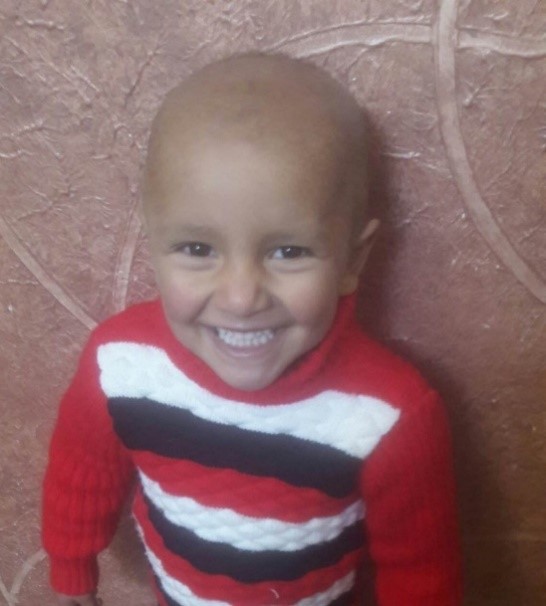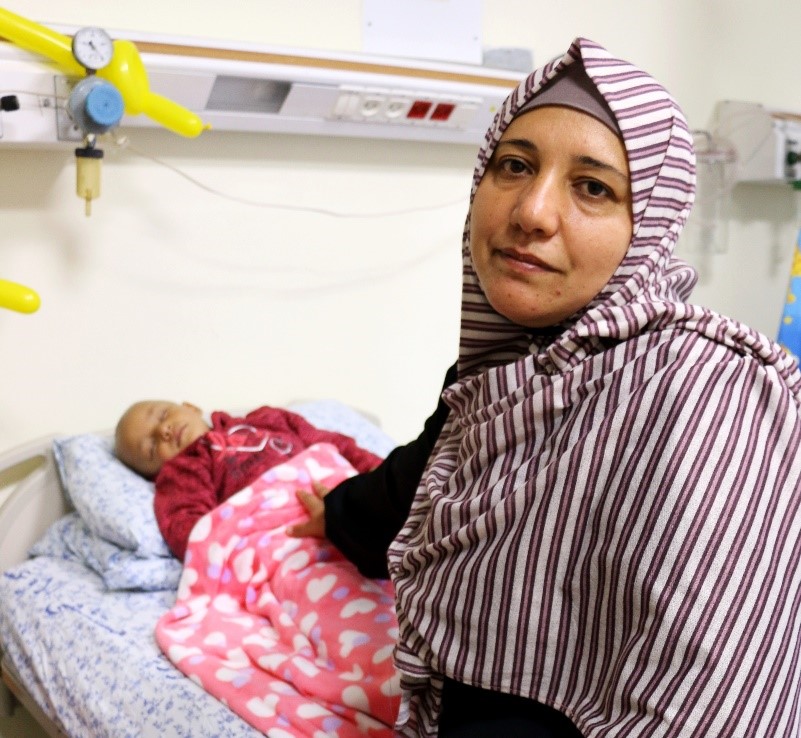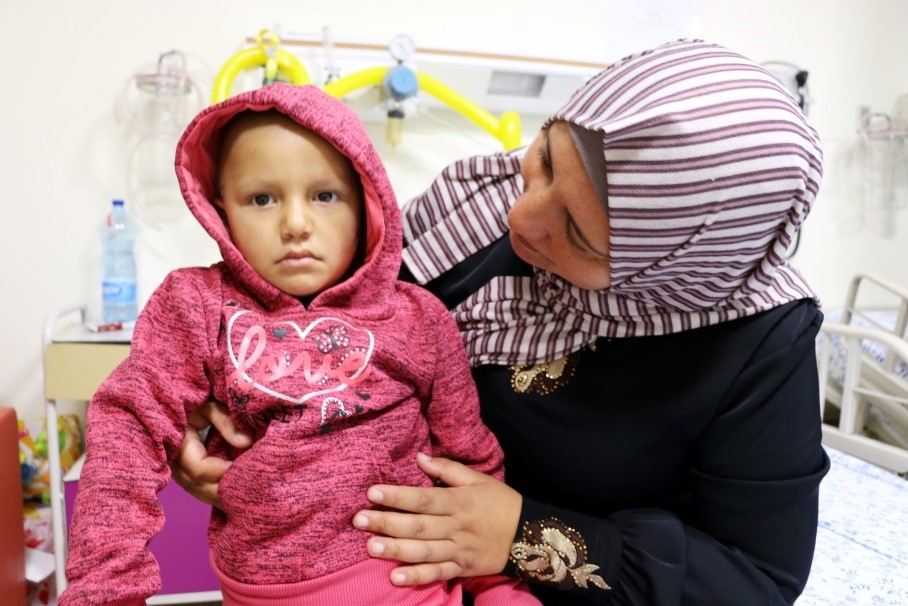 “Jana is one of hundreds of children who depend on Israeli-issued permits to travel to health facilities outside the Gaza Strip and for accompaniment of their parents.“
“Jana is one of hundreds of children who depend on Israeli-issued permits to travel to health facilities outside the Gaza Strip and for accompaniment of their parents.“
Three-year-old Jana from Jabalia in the north of the Gaza Strip has cancer, but she hasn’t been able to access the treatment she needs since October last year. Jana and her mother’s applications for Israeli-issued permits, required for her to access health facilities outside the Gaza Strip, have been repeatedly delayed or denied. Jana’s mother, Maysa, was increasingly concerned, “Jana was in a very critical condition. Doctors in Gaza told us that if she didn’t get treatment in time, she would need to undergo kidney dialysis.”
On the evening of Saturday 15 February, the day before Jana’s appointment, Jana and Maysa received a text message informing them they had been approved permits to travel to Augusta Victoria Hospital in East Jerusalem. Maysa talked about her relief, “I jumped up from the bed to the floor and started shouting, I was so happy as if I’d won a 1000-dinar prize!”. At 6am on Sunday 16 February, Jana and Maysa began the journey from their home to Erez checkpoint. Up to the last minute, Maysa was anxious and afraid they might be turned back.
Jana’s family discovered she had a tumour in 2018 when she was unable to pass urine and her family took her to Al-Shifa Hospital in Gaza City. A CT scan showed a tumour in her bladder and she underwent surgery to have it removed in January 2019. Initially the doctors at Al-Shifa had thought the tumour was benign. However, a biopsy in May 2019 confirmed that Jana had a cancer called a rhabdomyosarcoma.
From July 2019, Jana underwent a course of chemotherapy. Due to the size of her tumour, Jana then needed radiotherapy treatment that is not available in the Gaza Strip. She was referred to Augusta Victoria Hospital in East Jerusalem in October 2019, which required travel out of Gaza and an Israeli-issued permit. However, her permit application to Israeli authorities was delayed, remaining ‘under study’ by the time of her hospital appointment, and her mother’s application was denied.
 “I jumped up from the bed to the floor and started shouting, I was so happy as if I’d won a 1000-dinar prize!“Jana’s family discovered she had a tumour in 2018 when she was unable to pass urine and her family took her to Al-Shifa Hospital in Gaza City. A CT scan showed a tumour in her bladder and she underwent surgery to have it removed in January 2019. Initially the doctors at Al-Shifa had thought the tumour was benign. However, a biopsy in May 2019 confirmed that Jana had a cancer called a rhabdomyosarcoma.
“I jumped up from the bed to the floor and started shouting, I was so happy as if I’d won a 1000-dinar prize!“Jana’s family discovered she had a tumour in 2018 when she was unable to pass urine and her family took her to Al-Shifa Hospital in Gaza City. A CT scan showed a tumour in her bladder and she underwent surgery to have it removed in January 2019. Initially the doctors at Al-Shifa had thought the tumour was benign. However, a biopsy in May 2019 confirmed that Jana had a cancer called a rhabdomyosarcoma.
From July 2019, Jana underwent a course of chemotherapy. Due to the size of her tumour, Jana then needed radiotherapy treatment that is not available in the Gaza Strip. She was referred to Augusta Victoria Hospital in East Jerusalem in October 2019, which required travel out of Gaza and an Israeli-issued permit. However, her permit application to Israeli authorities was delayed, remaining ‘under study’ by the time of her hospital appointment, and her mother’s application was denied.
Since October 2019, Jana and Maysa applied three times for permits to exit Gaza so Jana could access the radiotherapy treatment she needs to have the best chance of recovery. Jana’s applications were delayed, remaining ‘under study’ by the time of her hospital respective appointments. Maysa’s applications to accompany Jana were once denied and twice delayed. The process has been a difficult and stressful one for Jana’s family, especially for Maysa: “I am Jana’s mother. I should have priority to accompany my daughter for such significant treatment. In any case, my daughter is a small child and she would have been distressed to be away from me for this amount of time.” Jana has four other siblings at home, two sisters and two brothers. Her oldest sister is a first-year student at university and youngest sister is in fourth grade.
Jana’s mother is waiting to find out the full treatment plan for her daughter at Augusta Victoria Hospital, which will depend on the test results. She is waiting to hear how long they will need to stay in Jerusalem and whether they will be able to go back to Gaza between treatments. The Palestinian Ministry of Health covers treatment costs, but the family has to pay for the transportation and other needs. The process can become a costly one, placing strain on the families of patients from the Gaza Strip, which has some of the highest rates of unemployment in the world, with nearly half (46%) of people living below the poverty line.
Hundreds of children like Jana in the Gaza Strip continue to face barriers and delays to health access, as well as potential separation from their parents. In 2019, more than a quarter (28%) of the 7,566 permit applications for children to exit the Gaza Strip for healthcare were unsuccessful – either denied (5%) or delayed (23%), with families receiving no definitive response to their permit applications by the time of their hospital appointments. In the vast majority of cases, Israeli authorities provide no explanation for why permit applications are not successful.
 For children receiving permits to travel for healthcare, almost two-fifths (38% or 2,068 of the 5,459 approved permits for children) were approved for exit without the accompaniment of their parents.
For children receiving permits to travel for healthcare, almost two-fifths (38% or 2,068 of the 5,459 approved permits for children) were approved for exit without the accompaniment of their parents.
The benefit of family support to children is not only critical for emotional support of paediatric patients, but close involvement in a child’s healthcare improves family understanding of the child’s illness and needs for longer-term care. Non-approval of permits for patient companions represents a major barrier to ensuring effective care for children and others who are strongly dependent on families for longer-term care and recovery.
Related links:
WHO Monthly report on referral of pateints from the Gaza Strip, January, 2020








